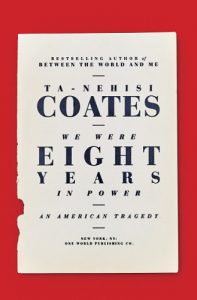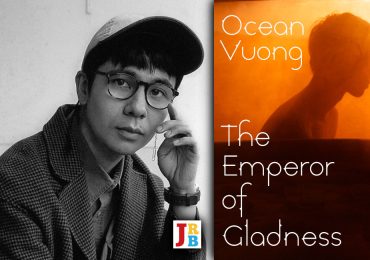Ta-Nehisi Coates is not the voice of black people—and, crucially, neither does he aspire to be, writes Kibo Ngowi.
 We Were Eight Years in Power
We Were Eight Years in Power
Ta-Nehisi Coates
Penguin Random House, 2017
1. The cult of intersectionality
Recently, as I was reading about the highly publicised spat between two of America’s most prominent black intellectuals, Ta-Nehisi Coates and Cornel West, I kept thinking about something Coates said in an interview with Playboy magazine in 2016:
I want the notion of there having to be ‘the voice’ for black folks completely obliterated. There is no one voice on climate change. There’s no one person on sports. I think that allows for a kind of laziness among nonblack people who don’t want to read other people’s shit. It saves them from having to compare me with other writers who are not black. It allows them to say, ‘You’re king of the blacks over here.’ The journalism I’m making stands up with any of these white folks you want to put up. If you want to have a conversation about where I stand in my field, we can talk about that. I’m black, very proud to be black, standing within the tradition of other black writers. That’s my culture, that’s my ethnicity, that’s my struggle, that’s my tradition, that’s my literature, but don’t use that as an excuse not to explore that tradition.
While I would never try to argue that Coates is above scrutiny, I suspect that much of the criticism directed toward him is predicated on the misguided idea that he should aspire to speak for all black people, everywhere. Call it a cult of facile intersectionality if you like, but however you describe this phenomenon it’s an entirely unfair standard to place on any writer.
2. A limited but necessary perspective
Coates first broke onto the scene with the publication of his article ‘The Case for Reparations’, the June 2014 cover story of The Atlantic magazine. It mounted an argument in favour of compensating African-Americans for the devastating effects of slavery, ‘separate but equal’, Jim Crow, redlining—all practices underwritten by white supremacy. Editors at the publication say the article attracted more unique visitors to its website in a single day than any previous story, and the June issue of the magazine sold sixty per cent more copies from the newsstand than its 2013 counterpart.
Then came Coates’s Baldwinesque memoir about growing up black in America and reckoning with the impact of white supremacy on his own life and the lives of those around him: Between The World And Me (2015). The book enjoyed significant critical acclaim, winning the National Book Award and setting up its author to be selected for the MacArthur Fellowship, also known as the ‘Genius Grant’, a prestigious recognition of excellence, originality and creativity.
However, Between The World And Me also attracted the scorn of some black intellectuals, including bell hooks, who asked, ‘Is it a letter to your son, because you want him and other black boys to understand, or is it a letter to white people, so that you can let them know you’re not like those other trifling negroes that don’t have shit to say to their sons?’ West also chimed in, calling Coates ‘a clever wordsmith with journalistic talent who avoids any critique of the Black president in power’.
Following the publication of Coates’s latest book, We Were Eight Years In Power, that scorn was revived through an essay West wrote for The Guardian. The Harvard University philosophy professor criticised Coates for what he views as a neoliberal, tribal and dangerously misleading fixation on racial issues without the broader context of global imperialism, and has had thinkers and activists sharply divided, black and nonblack alike.
Coates’s most notable defender has been Columbia University journalism professor and New Yorker staff writer Jelani Cobb, his long-time friend. In a Twitter thread, Cobb contended that criticisms such as West’s were rooted not in intellectual disagreement but rather in academic elitism. He wrote: ‘I can’t tell you how many times black academics have tried to turn me against my friend on the low … But underlying all this is another dynamic. Plain classical elitism … Straight up: many people hate the fact that the person being hailed as possibly the sharpest black intellectual writing about race is an HBCU [Historically Black Colleges and Universities] dropout.’
Others, such as Black Lives Matter co-founder Patrisse Cullors, African-American studies professor Carol Anderson and Kenyan South Africa-based writer Shailja Patel, have argued that the global fight for justice and human rights for people of colour is not assisted by a spectacular clash of personalities. Patel wrote on Twitter: ‘Imperial privilege is reducing a vital assessment of Barack Obama’s devastating harm to Black and Brown peoples outside the US to a personal beef between two African-American men.’
The criticisms of Patel and others have merit, but as Coates explained recently during a public discussion about his work, he can only write from his particular perspective. In other words, if his work seems black-male-centric, it’s unavoidably so. The real problem seems to be that the literary establishment elevated Coates’s work, particularly Between The World And Me, to such a high level of regard that people have felt the need to highlight how limited Coates’s work is in reflecting the experiences of black people, not just in America, but the world over.
With all due respect to Toni Morrison, nothing Coates has written is ‘required reading’, as she remarked in her cover shout for his much-celebrated book. While I appreciate his work, I don’t think reading it has been essential to my intellectual development. I’m also under no illusion that Coates will extend his analysis to considering how US imperialism affects people of colour outside his home country (though he has, despite West’s assertions, been critical of Obama on foreign policy). If Coates wants to focus his analysis on the black experience in American history he’s well within his rights to do so.
Coates’s work offers an alternative United States history that places black life at its centre and makes us consider how the legacy of white supremacist anti-black policies can stretch forward for generations. For that reason I believe his writing to be important and necessary—not just for readers in America but also for those in post-apartheid South Africa and across the postcolonial world. But Ta-Nehisi Coates is not the voice of black people—and, crucially, neither does he aspire to be, despite various attempts by both his admirers and detractors to saddle him with that ambition.
The energy of Coates’s critics, including West, would more valuably be directed at encouraging diversity in the publishing industry, so there isn’t just one book by one man that’s expected to reflect the experiences of people of colour everywhere. The more diversity we have in the voices given access to platforms through which they can share their unique perspectives the less desire there will be to heap unrealistic expectations on individual writers.
With that said, one can see why West would take issue with Coates’s emphasis on racism, given the fact that West tackled these issues in his work decades ago and has moved on to a global critique of imperialism and capital. But you have to understand where writers like Coates are coming from in their revival of racial themes. With the election of Barack Obama as the US president, the rhetoric of a post-racial America emerged. The liberal establishment pushed a myth that the US had finally turned a corner on racism, and a new generation of young black writers pushed back.
Coates’s 2014 article gained so much attention precisely because it confronted conventional wisdom on race in America and called ‘bullshit’. As Coates himself acknowledges, the election of a black president opened up a space for black writers to talk about race on major platforms that either didn’t exist or weren’t as open before—writers like himself, Rachel Kaadzi Ghansah, Nikole Hannah-Jones, Jesmyn Ward, Mychal Denzel Smith, Kiese Laymon, Claudia Rankine, Garnette Cadogan, Paul Beatty, Angie Thomas, and many others. The other thing Obama’s presidency did, though, was create a sense of disillusionment in the power of a black president to change the status quo. Throughout Obama’s tenure, black lives kept being snatched away, dispatched to the hereafter by trigger-happy police officers and vigilantes. And so came the birth of a new black revolutionary spirit, embodied most forcefully by Black Lives Matter. Partly as a reaction to this, America experienced a resurgence of white supremacist ethno-nationalism, which facilitated the election of an openly bigoted president in Donald Trump.
While the two countries have highly distinctive political histories, a similar phenomenon has been occurring in South Africa. The end of apartheid promised a new post-racial democratic rainbow nation, but more than two decades later severe inequality, particularly along racial lines, persists. A new generation of activists has taken up the struggle for equality, seeking to complete what they see as South Africa’s unfinished revolution, most notably through Rhodes Must Fall and Fees Must Fall.
3. Obama and the threat of ‘good negro government’
It is in this context, then, that Coates emerged as an important voice for black resistance against systemic racism. We Were Eight Years in Power is actually his third book. The first, published in 2008, was The Beautiful Struggle, and focused on his childhood in West Baltimore during the crack epidemic, putting particular emphasis on the influence his father Paul Coates, a former defense captain in the Black Panther Party, had on his and his siblings’ upbringing.
That first of his three works, which could all be loosely described as memoirs, was written in a kind of sophisticated hip-hop prose, containing slang more commonly found in rap music. Coates was experimenting with different styles, trying to find the right language to capture the African-American experience, until he finally landed on the resplendent, evocative prose that elevated Between The World And Me to an instant classic.
We Were Eight Years in Power, meanwhile, is a collection of articles published during the years of Obama’s presidency, along with an extra article reflecting on the election of Trump. Each is preceded by a personal essay that offers insight into Coates’s state of mind and the condition of his life when he first wrote the article—and how he feels about it now. They are the book’s greatest strength, as they give us a window into how Coates’s perspective evolved over time and how his fortunes changed dramatically, from seeking redemption in an unemployment office to interviewing the first black US president in the Oval Office.
The articles see Coates analysing the black conservative ideals preached by pre-fall-from-grace Bill Cosby; exploring how the unique upbringing and formidable intelligence of Michelle Obama made her her husband’s greatest asset; meditating on how African-Americans’ apathy to Civil War history allows the US to avoid a true reckoning with its foundational history of slavery; pondering on how downplaying his race in order to protect the fantasy of white innocence became a key feature of Obama’s presidency; and examining how mass incarceration has become a defining feature of the black family during the last three decades. That’s not to mention the lauded Atlantic article that first brought him to public attention.
The book’s title is a reference both to Obama’s presidency and to the Reconstruction era of the eighteen-sixties and seventies, during which Congress attempted to transform the Southern US, transitioning it from a group of states dependent on slavery to a group of states in which former slaves were citizens with civil rights. Coates argues that Reconstruction was successful until it was sabotaged by the South’s white elites, unwilling to relinquish their racial privilege. Following a critique of WEB Du Bois’s, he neatly draws a connection between Reconstruction and the election of Trump—both of which prove that the only thing white society feared more than ‘bad negro government’ was ‘good negro government’. He writes:
[Obama] was not a revolutionary. He steered clear of major scandal, corruption, and bribery. He was deliberate to a fault, saw himself as the keeper of his country’s legacy, and if he was bothered by his country’s sins, he ultimately believed it to be a force for good in the world. In short, Obama, his family, and his administration were a walking advertisement for the ease with which black people could be fully integrated into the unthreatening mainstream of American culture, politics, and myth. And that was always the problem.
There’s an obvious strength in being this dedicated to a single subject—race in America—over the length of an entire book: Coates possesses an unusual depth of knowledge of his theme, and an ability to write about it with visceral clarity. But there’s also a flaw. By the final essay in Eight Years, Coates starts to sound like a broken record, and that feeling may come even sooner for impatient readers.
Coates sees himself as belonging to a proud American tradition, running the gauntlet from Richard Wright to Kendrick Lamar, and says the thing he always respected most about these writers was their ability to tell the truth in all its plain ugliness. Coates has the same ability, which has often put him in an uncomfortable position, navigating a national culture that prides itself on stories of overcoming the odds, determined not to discuss his insights without demanding that he offer some signs of hope. Coates shares his feelings on this dynamic frankly:
There was a kind of insanity to this—like telling doctors to only diagnose that which they could immediately and effortlessly cure … Imagining the smallness of my own life span against the span of American history, and thinking how many lifetimes went into the creation of the problem of white supremacy, meant that any solutions I gave would likely require the work of generations. Moreover, my solution might seem crazy in this moment—much as abolition seemed ‘crazy’ for decades, right up until it happened—but must be considered anyway.
Yes, it is not the job of a writer to offer hope, and Coates, the black truth-teller, rejects the expectation outright. But to say he has never offered a solution is disingenuous; it was offering a solution that first put him in the limelight. That solution has drawn severe criticism, but nonetheless may be the only hope for redeeming the shameful history of the most powerful nation on earth: reparations for slavery. Both Coates’s admirers and his detractors would be better off debating that instead of the author’s unwanted status as the ‘voice of black people’.
- Kibo Ngowi is a journalist and essayist whose work has been published in Botswana, Nigeria, South Africa and the United Kingdom. He is based in Johannesburg, and is a regular contributor for Destiny, Destiny Man and Sawubona.






You seem a touch bitter to be frank.